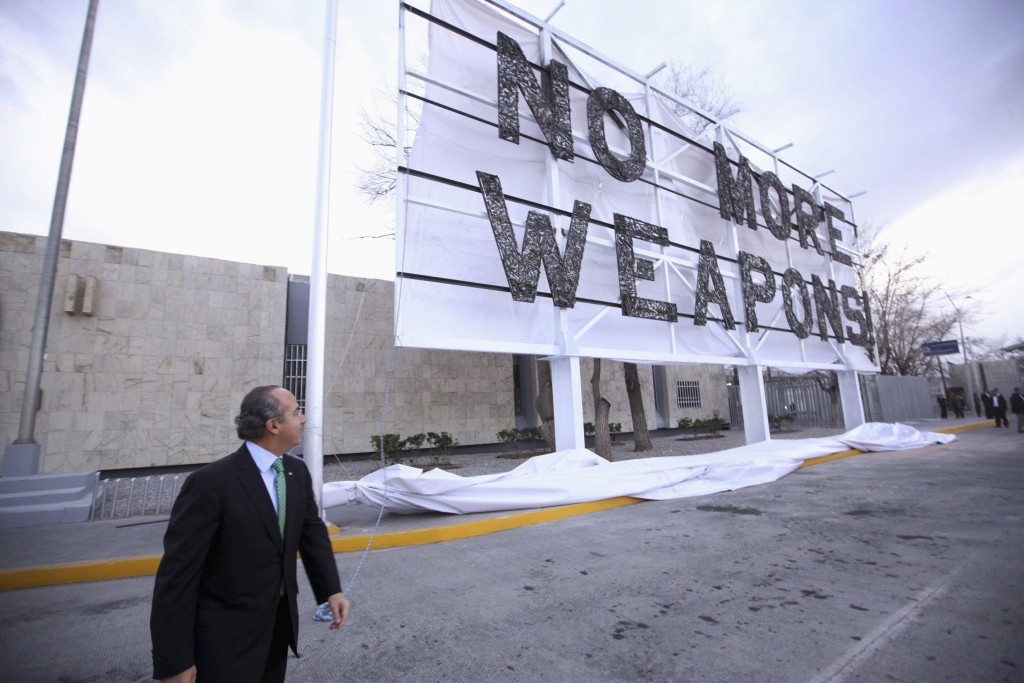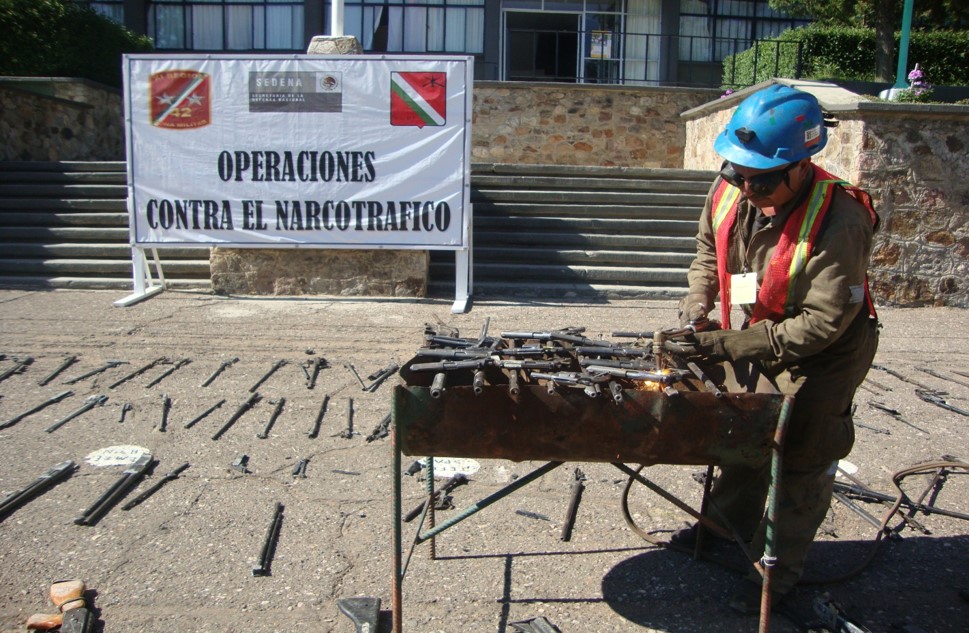No More Weapons
The Mayor of Ciudad Juarez and the Governor of Chihuahua, in Mexico, issued a redemptive message to Americans on June 17: Mexico is safe, Mexico is welcoming, and blaming our agony on you was a mistake. The two leaders had incessantly pushed for the removal of a bullet-crafted, 8 x 21 meter sign placed at the International Bridge of the Americas in 2012, which read, “NO MORE WEAPONS.” According to the Texas Department of Transportation, over 3 million vehicles crossed the bridge that year, many driven by American citizens who work, inhabit, and invest in the border city on a daily basis.
“Placing it was not neighborly,” trumpeted Enrique Serrano Escobar, the Mayor of Juarez, “removing it is a sign of friendship.” As the clock struck noon that Wednesday, the disheartening reminder of the city’s agony was set for removal.

Six hours later, Dylan Roof massacred nine congregants with a 0.45 caliber handgun at the Emanuel African Methodist Episcopal Church of Charleston, South Carolina.
The event generated an uproar in the United States. First, citizens denounced racial discrimination and legally enshrined symbols of white supremacy in a period of mourning. The conversation, however, quickly turned to gun regulations in the United States.
“Once again, innocent people were killed,” lamented President Obama in a statement to the nation, “in part, because someone who wanted to inflict harm had no trouble getting their hands on a gun.”
The U.S. debate over arms control is neither new nor outdated. The most recent event only serves to reignite a consistently inconvenient topic in U.S. politics. Yet, according to Mark Knoller of CBS, Charleston marked at least the 14th time the President addressed the nation on cases of gun violence.
The Gun Violence Archive reports that over 6,000 people lost their lives due to gun-related crimes within the U.S this year. Yet, the country’s lax gun regulations also affect non-U.S. citizens, a fact easily forgotten in the face of tragedy.
In a press release by the U.S. Bureau of Alcohol, Tobacco, Firearms and Explosives (ATF), the bureau reported that Mexican authorities decommissioned 68,000 U.S. weapons at the height of the War on Narcotrafficking. In other words, nearly 70% of the weapons used illegally in Mexico at the height of the war were smuggled U.S. merchandise.
The most generous estimate of gun-related homicides in Mexico totals 33,000 casualties between 2007 and 2011. If only 70% of these were due to U.S. weapons, the death-count by illegally trafficked U.S. firearms still reaches an astounding 23,000 casualties in four years – higher than the defense department’s tally of U.S. casualties in the Afghanistan War.
It was for this reason that, after participating in the manual destruction of over 100 thousand weapons in Ciudad Juarez in 2012, then-President Felipe Calderon called upon the American people and Congress to take action.

“Mexico needs your help,” he said, “the best way you can help reduce the violence in Mexico is with a law that halts this inhumane trafficking of weapons to Mexico.”
If the repeated statements by presidents and the continuing score of fatalities by U.S. weapons cannot galvanize U.S. politicians into action, perhaps a look at Mexico’s misfortunes will.
The brutal political assassination of 43 students in September shook the entirety of Mexico into a new wave of social movements. For Mexicans, the events were reminiscent of the rampant political repression, cover-ups, and corruption endemic to the pre-democratic years. The political elite was newly delegitimized, civil society disheartened, and scandals reached the presidency, engendering prominent calls for his resignation.
Whereas his predecessor addressed the violence in Mexico by the horns, President Enrique Peña Nieto’s administration chose to look the other way. While the political cadre has implemented many reforms in the past three years, the 43 were powerful testaments to a simple reality: The ills that afflicted Mexico are still present, widespread, and damaging to the country.
At some point, Mexicans around the world protested #YaMeCansé (I have had enough).
On June 18, President Obama stated, “I’ve had to make statements like this too many times.” That day, civil society screamed, once again, #BlackLivesMatter. For politicians in the United States, the specter of the nation’s repressive past was once again resurrected via a public debate on the symbolic Confederate Flag.
In light of recent events, it would be foolish to believe the issues that plague the United States are solely its own. The United States is also on a ledge; but its legislators can do plenty to help prevent future victims, and let that trickle down in positive effects to the rest of the world.
Now, more than ever, U.S. politicians need to acknowledge the uncomfortable, but truthful, “NO MORE WEAPONS” plea from their southern neighbors.
Before - not after - the next tragedy strikes.
